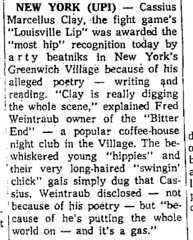He himself did not drink, said Alpert, airily explaining: "I have no need to dull my senses."
Not with alcohol. Last week Alpert was arrested for the possession of narcotics. When Norwalk police stopped his blue 1958 Volkswagen, they found 1½ oz. of marijuana hidden where the batteries should be in a 3-in. flashlight in the glove compartment. And in his pocket was a tin tobacco box containing several marijuana cigarettes.
Alpert, according to the police, admitted that he had been using marijuana for about a year, and that he also kept his senses spinning by sniffing model-airplane glue and eating "goofballs" (barbiturates) and hallucinogenic peyote.
In the article, Alpert is described as part of "a fast set of hard-shell hippies ... who seem utterly glamorous to more sheltered types."

